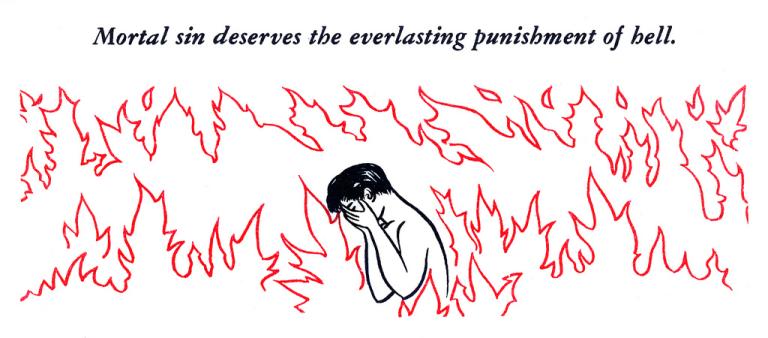“We have foolishly conceived you to be a tyrant over human life.” –St Augustine
I’ve had a lot of trouble finding a priest who believes in the devil. They usually dismiss my fears of the man with the pitchfork and speak instead of an amorphous evil or darkness at work in the world, if they’ll acknowledge evil at all. Evil is out of style. We’re the Church of Mercy.
But a Catholicism that’s obsessed with hell had a stranglehold on the American south in the last century. Growing up even as late as the 1980s, my girlfriends and I all feared demon possession as much as we did the eternal hell fire shown in the graphic cartoons in our children’s catechism. Or maybe we all just saw The Exorcist one too many times. So many of my friends left the church as teens and adults who’d worn themselves out feeling guilty and afraid.
But I didn’t dare.
Even Flannery O’Connor, fellow southerner and the great patron saint of Catholic writers, felt as I did—she worried in her prayer journal that her fear of hell was the only thing keeping her faith.
To be fair, it wasn’t just southern Catholics who were obsessed with the devil. My dad left the Catholic Church after my mother’s death when I was 14, and he became a proof-texting, Bible wielding, Chick Tract distributing Pentecostal. But we still talked about demons more than we talked about Jesus, and about condemnation more than love.
At Thanksgiving one year, he attempted to perform an exorcism on my aunt’s dog. 
By the time I returned to the church I was afraid of the Bible. I was sure it told the terrifying story of a fallen humanity, ruled by our passions, fierce and stubborn enough to kill our own God, who rightly punishes us and rewards only those who embrace their suffering. For all my liberal-arts Catholicism, I was, deep down, an old-school pagan, convinced that God demanded blood. So I left the Bible to the Mass and buried myself instead in theology, philosophy, art and literature.
Then my life fell apart. It keeps doing that.
During a particularly dark night of the soul, I foolishly agreed to write a book of daily devotions based on the Catholic lectionary—about 400 meditations on scripture.
I’m a career spiritual writer, but I don’t read devotional books. Unfounded or not, I imagine them to be a genre of soft-focus covers, churchy, pious language and stock Christian platitudes. So even though I’ve written books and essays that might be shelved as “inspirational,” my stubborn belief in God has mostly been inspired by secular art.
But when I signed the contract for the devotional book, I was completely disenchanted with faith, and Tolkien and Terrence Malick were no longer carrying the day. When the press approached me, I thought, well, why not? It’s time I figured out for myself what that big book says. I was tired of being afraid of God, tired of believing in a deity who demanded suffering. I wanted to search the scriptures for the God of love I’ve heard so much about but couldn’t seem to find in my own life. I wanted a reason to keep believing—a better reason than fear.
As O’Connor wrote, “I don’t want to fear to be out. I want to love to be in.”
In the early stages of writing the book, I had a phone date with a friend who was raised Catholic and now goes to a Unitarian Church. She told me she still believes in God–most of the time–but she’s haunted by questions: “What if we’re wrong? What if we die and there’s nothing there?” She’s worried about lying to her children about God, spinning fictions.
“Yes, what if we’re wrong?” I said. “But what if instead of nothing, we die and we find God shaking his head in sorrow, because we spent our whole lives in terror of the one who truly loves us?”
My answer surprised me. It wasn’t something I’ve ever said or even thought.
My questions guided me as I started writing the book, searching each day’s scripture readings for the God of grace. Very quickly, I discovered how easy a task it was. I began to suspect that I’d been wrong, that the Bible was not a terrifying book of condemnations and prohibitions, but the ongoing saga of God and creation, a tale of repeated attempts to cultivate relationship with us, culminating in an act of unfathomable divine love, the incarnation and all it implies–the willingness to suffer and die like we do.
As I read the scriptures and wrote, I still wallowed at rock bottom. I’d just left behind another home I loved, which I was sure was more than I could bear after losing so many throughout my life. My young family was wounded and limping along. I felt I deserved the pain I was experiencing, and my parish priest, at one point, pretty much agreed with me. So much for the Church of Mercy.
I took my children and flew to my childhood hometown—which still bears the scars of destruction by Hurricane Katrina ten years ago—thinking it would help me to recover from a fresh round of trauma. Boy, was I wrong. All the painful memories flooded in, and I broke down.
As I cried on my dad’s sofa, my stepmother, trying to comfort me, told me to “hold onto Jesus’ cloak.” This is exactly the sort of Christian platitude—however scriptural it may be—that makes me recoil. There were too many times when I was a little girl grieving my mother that I felt as if my dad dismissed my pain with a Bible verse when he should have just held me and told me he loved me. But this time, the phrase hold onto his cloak haunted me for weeks. Why do people say stuff like this? What does it mean? How is it possible? Why does it comfort anyone at all? Why didn’t it comfort me?
I returned to the Gospel story about the woman who reaches out for Jesus’ cloak in a crowd. He doesn’t see her, but he feels power leave him and calls out, ”Who touched me?”
How afraid she must have been. And how brave. What did that woman believe in? Was she so desperate for healing that she would have tried anything, reached out to caress any old idol or image, including this man who seemed to have magical powers? Would she have just as soon sought out a witch in a hut? Why was her superstitious faith rewarded?
What Andrew Sullivan had to say about this in his book about Jesus and women really moved me. Maybe, he says, this woman’s faith was in nothing more than the possibility of grace in this world. Maybe all we have to do is yearn for its source.
So I wrote my daily devotions, full of doubt, shame, anger and sadness. As I wrote, I prayed only for the gift of that anonymous woman: I prayed to remain open to the possibility of grace, to reach out, to hold on.
Sick Pilgrim’s Dark Devotional, which we’ll launch this Friday, will be that kind of prayer. The kind that struggles to understand, often gets it wrong, but reaches out anyway for the source of all grace, and holds on.













